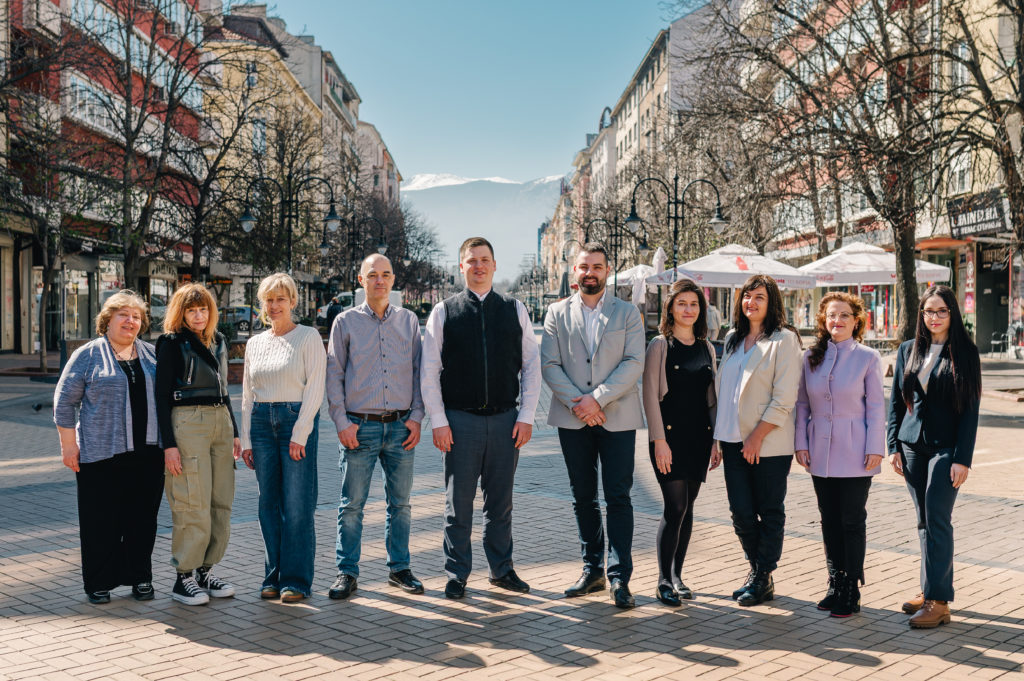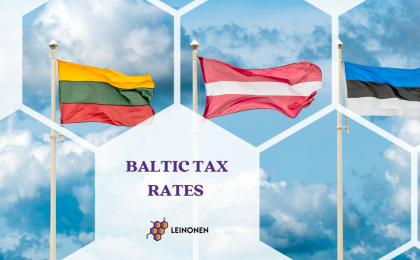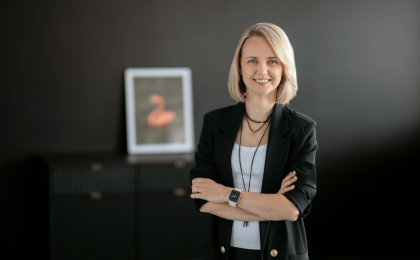After working for seven years at Leinonen Group’s HQ office, where he most recently held the position of Group Sales and Marketing Manager, Dmytro Pavlenko took a big step. He moved to Bulgaria to grow the newly formed Central Region, which includes Bulgaria, Hungary, and Poland. In this interview, Dmytro talks about his move, the differences between these countries, why the region has strong business potential, and how his team is working together across borders.
You have lived and worked in several countries before. How has the move to Bulgaria been for you personally?
This was my first time moving so far away for work. Before, even if I worked on international projects, like in Sweden or Norway, I was still based in Estonia, and the flights there would take around an hour. Now I live in Sofia, which is a very different place and much further away, a trip home to Estonia takes a full day. The climate is one big change — summers can be extremely hot, with temperatures reaching +40 degrees. On the positive side, winters are not so dark, which I enjoy. The culture is also much more extroverted compared to Estonia. People are more direct, more open, and more social. It’s been challenging at times, but a great opportunity to learn a lot about different ways of communicating and working.
Was there anything surprising about life or business in Bulgaria?
Yes, quite a few things. Before, I had heard many warnings — about extreme bureaucracy, destructive corruption, and outdated systems. But when I arrived, I saw that much of this is changing and very fast. Bulgaria feels very safe, people are friendly, and the business environment is much better than I expected. There is still a lot of paperwork and formalities, but digital services are improving quickly. One big surprise was access to business loans. Interest rates here are much lower than in the Baltics — sometimes as low as 2–3% total. That makes it easier for companies to invest and grow, and we’ve already seen our clients take advantage of this.
What are the main reasons businesses are entering the Central Region now?
One is that the economies in Central Europe are still growing, while many other parts of Europe are stagnating. That makes this region more attractive for investment. Second, the cost of doing business is still lower, not only salaries but also energy costs and taxes, especially in Bulgaria and Hungary. And third, financing is easier. Businesses can get low-interest loans, which helps with expansion, especially in manufacturing. When you put all of this together — lower costs, easier financing, and market growth — it’s clear why more companies are entering this region. Furthermore, I would like to highlight Poland as an emerging star on the European stage. The country’s business potential continues to grow at an impressive pace, even as other markets show signs of slowing. It’s also leading in the digitalisation of it’s administration.
You were in a marketing and sales role before. How has it been to move into regional leadership?
The most significant shift has been the ability to create direct impact. In my previous group-level role, I worked behind the scenes supporting multiple countries. Now, leading a regional team, I have the opportunity to shape how we operate locally. I was appointed to support the Group’s growth plans in this region, and my background in data and sales has been key. I’m also fortunate to work with a strong regional team that has made this transition much smoother. For me, the title is secondary—what matters is the value we create together. I strive to lead in a practical, fact-based way, which I believe is a universal approach to effective leadership.
How do you manage such different cultures in Bulgaria, Hungary, and Poland?
With my background, I strongly advocate for Nordic management principles, which are also deeply embedded in Leinonen culture. I focus on empowering people by giving them autonomy while guiding direction through clear priorities and measurable KPIs. This approach is generally well-received. At the same time, I remain open and adaptive—another core Nordic value—recognizing that each country has its own customs and preferences.
A great example was our team event in Bulgaria. I initially proposed a quieter, more formal evening—a musical performance followed by a wine tasting. However, the team preferred something livelier, with dancing and traditional music. We went with their idea, and the event turned out to be a great success. It reinforced my belief that involving people in decisions not only leads to better outcomes but also strengthens team connection and trust.
Are the teams working more as one regional unit now?
Yes, more than ever. We share common goals, hold regular regional meetings, and collaborate on joint projects. This scale benefits the business too, allowing us to streamline processes and optimize resource use. One of the most valuable outcomes is our ability to specialize, focus resources, and exchange experiences on a deeper level.

Involving people in decisions not only leads to better outcomes but also strengthens team connection and trust.
Dmytro Pavlenko
A great example comes from our payroll team in Poland, who began using our company’s Copilot tool to automate data processing tasks. We’re now sharing this best practice with all the teams in Poland, Hungary, and Bulgaria. When people see their ideas making a broader impact, it promotes unity. It also strengthens our sense of belonging, not just to our local offices, but to a larger regional community.
What is different about doing business in Poland, Hungary, and Bulgaria?
In our region each country is rather different. For example in Baltics of Nordics the countries themselves have many more similarities. Even when you say Central European region to an external they are guaranteed to all mention different set of countries. Cultures are absolutely different and even alphabet differs. So if you plan to expand into this region, each country requires its specific attention.
However, they also have a lot in common. All three are developing fast and are moving towards more digital systems. Poland, for example, is leading the way in electronic invoicing and system-to-system reporting. Bulgaria is making big improvements in digital business administration, making it even possible to establish and run a business without physical presence. Hungary, with its Client Gateway and system-to-system reporting, is moving to digitalization strongly.
Is the new Central Region structure bringing value to clients?
Clients may not see big changes immediately, but they will in time. Behind the scenes, we’ve built stronger teams, clearer roles, and better tools. This means we can deliver faster, more consistent, and higher-quality service. We are also better organized now, with experts in different areas who support all three countries. Over time, this will make a big difference for our clients.
How is the Central Region performing compared to your expectations?
Overall, we’re on track. Some things are taking longer than planned, which, I guess, is normal. But we’re growing — in number of clients, in team cooperation, and in how we manage operations. We have set ambitious goals for the year, and I believe we will reach them. I’m also happy to see the team spirit growing stronger across countries. That gives me a lot of confidence.
Do you still have time for yourself? What do you enjoy outside work?
At the beginning, I worked long hours to get everything set up. But now things are more stable, and I have more time. I enjoy hiking in the mountains — that’s something new for me, as Estonia doesn’t have many mountains. I also visit mineral water spas, which are very popular here. I still love saunas, and since I couldn’t find a proper one in Bulgaria, I ordered a Finnish sauna tent. And yes — I still collect Coca-Cola glasses! Some are in Estonia, and some are now here.
A big thank you to Dmytro for sharing his story and experiences with us! It was inspiring to hear about his journey from the Group HQ to leading the Central Region and how he’s helping shape the future of our operations in Bulgaria, Hungary, and Poland. We wish him continued success and look forward to seeing how the Central Region continues to grow under his leadership!






